
Wheat beer is a top-fermented beer which is brewed with a large proportion of wheat relative to the amount of malted barley. The two main varieties are German Weizenbier and Belgian witbier; other types include Lambic, Berliner Weisse, and Gose.

Pale lager is a pale-to-golden lager beer with a well-attenuated body and a varying degree of noble hop bitterness.

Märzen or Märzenbier is a lager that originated in Bavaria, Germany. It has a medium to full body and may vary in colour from pale through amber to dark brown. It was the beer traditionally served at the Munich Oktoberfest. The geographical indication Oktoberfestbier is protected in the EU and can only be used for Märzen that is brewed in Munich.
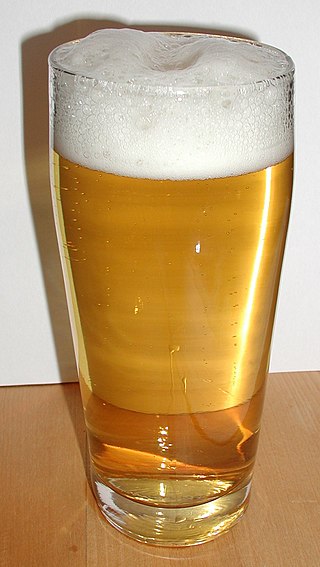
Helles or hell is a traditional German pale lager beer, produced chiefly in Southern Germany, particularly Munich. The German word hell can be translated as "bright", "light", or "pale".

Dunkel, or Dunkles, is a word used for several types of dark German lager. Dunkel is the German word meaning "dark", and dunkel beers typically range in color from amber to dark reddish brown. They are characterized by their smooth, malty flavor. In informal terms, such as when ordering at a bar, "dunkel" is likely to mean whatever dark beer the bar has on tap, or sells most of; in much of north and western Germany, especially near Düsseldorf, this may be Altbier.
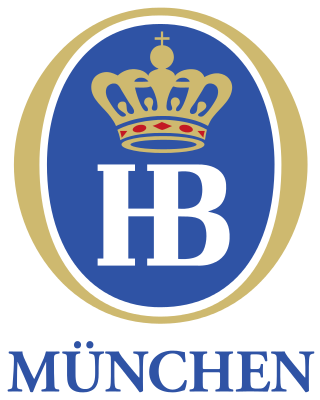
The Staatliches Hofbräuhaus in München is a brewery in Munich, Germany, owned by the Bavarian state government. The Hof (court) comes from the brewery's history as a royal brewery in the Kingdom of Bavaria. The brewery owns the Hofbräuhaus am Platzl, the Hofbräukeller and one of the largest tents at the Oktoberfest (Hofbräu-Festzelt).

A beer garden is an outdoor area in which beer and food are served, typically at shared tables shaded by trees.
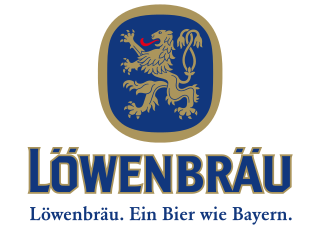
Löwenbräu is a brewery in Munich. Most of its beers are marketed as being brewed according to the Reinheitsgebot, the Bavarian beer purity regulation of 1516.

Spaten-Franziskaner-Bräu GmbH is a brewery in Munich, Bavaria, Germany. It produces Spaten and Franziskaner beers.

Beer is a major part of German culture. According the Reinheitsgebot, only water, hops, yeast and malt are permitted as ingredients in its production. Beers not exclusively using barley-malt, such as wheat beer, must be top-fermented.

The Hofbräuhaus am Platzl is a beer hall in Munich, Bavaria, Germany, originally built in 1589 by Bavarian Duke Maximilian I as an extension of the Staatliches Hofbräuhaus in München brewery. The general public was admitted in 1828 by Ludwig I. The building was completely remodeled in 1897 by Max Littmann when the brewery moved to the suburbs. All of the rooms except the historic beer hall ("Schwemme") were destroyed in the World War II bombings. The reopening of the Festival Hall in 1958 marked the end of the post-war restoration work.

Augustiner-Bräu is a brewery in Munich, Germany, established in 1328. It is Munich's oldest independent brewery.
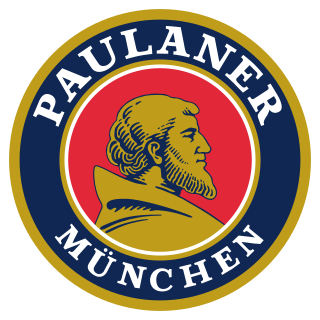
Paulaner is a German brewery, established in 1634 in Munich by the Paulaner Order of mendicant friars. Now owned by the Schörghuber family, it is one of the six breweries which provides beer for Oktoberfest. Paulaner ranks number six among Germany's best-selling beers.

Oktoberfest is the world's largest Volksfest, featuring a beer festival and a travelling carnival, and is held annually in Munich, Bavaria, from mid- or late-September to the first Sunday in October. The annual event attracts more than seven million international and national visitors at its peak. Locally, it is called d'Wiesn, after the colloquial name for the fairgrounds, Theresienwiese. Oktoberfest is an important part of local culture, having been held since the year 1810. Other cities across the world also hold Oktoberfest celebrations that are modeled after the original Munich event.
Anheuser-Busch InBev SA/NV is the largest beer company in the world. It had 200 brands prior to the merger with SABMiller on October 10, 2016. The combined ABInBev/SAB Miller entity has approximately 400 beer brands as of January 2017.

There are a series of tents at the Oktoberfest, which are operated by different Wiesn-hosts and in which some come from a long tradition. Some tents belong to the local breweries. The setup work for the tents often begins three months before the start of the festival.
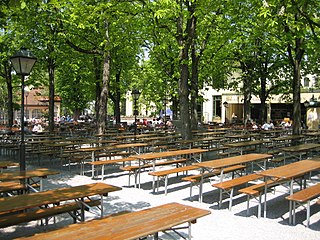
Nockherberg is the name of a small terrace on the slope of the eastern bank of the Isar in Munich, situated in the urban district of Au. An annual beer festival rich in tradition takes place there in the Paulaner Brewery - the Salvator-Ausschank auf dem Nockherberg The name of the raised terrace is often used synonymously for this festival or its opening event, the tapping of the first barrel of a strong, seasonal beer (Starkbieranstich).

The Aldersbach brewery is a traditional medium-sized brewery in Aldersbach, Lower Bavaria, opened in the 13th century. It produces beer types such as Dunkel, Helles, and Pilsner, plus seasonal Bock and Pale lagers. In 2016, it won awards from the Bavarian Brewers Association and the Bavarian State Beer Exhibition.

Spatenbräu is a brewery in Munich, Germany, with a history going back to 1397. Since 1922, the brewery has been part of Spaten-Franziskaner-Bräu GmbH, which has itself been part of the Spaten-Franziskaner-Bräu group since 1997. It is now owned by the Anheuser-Busch-InBev brewery group. The beer writer Michael Jackson considered the Spaten brewery as the most significant brewery in the history of lager beer because of its innovations in the 19th century.




















